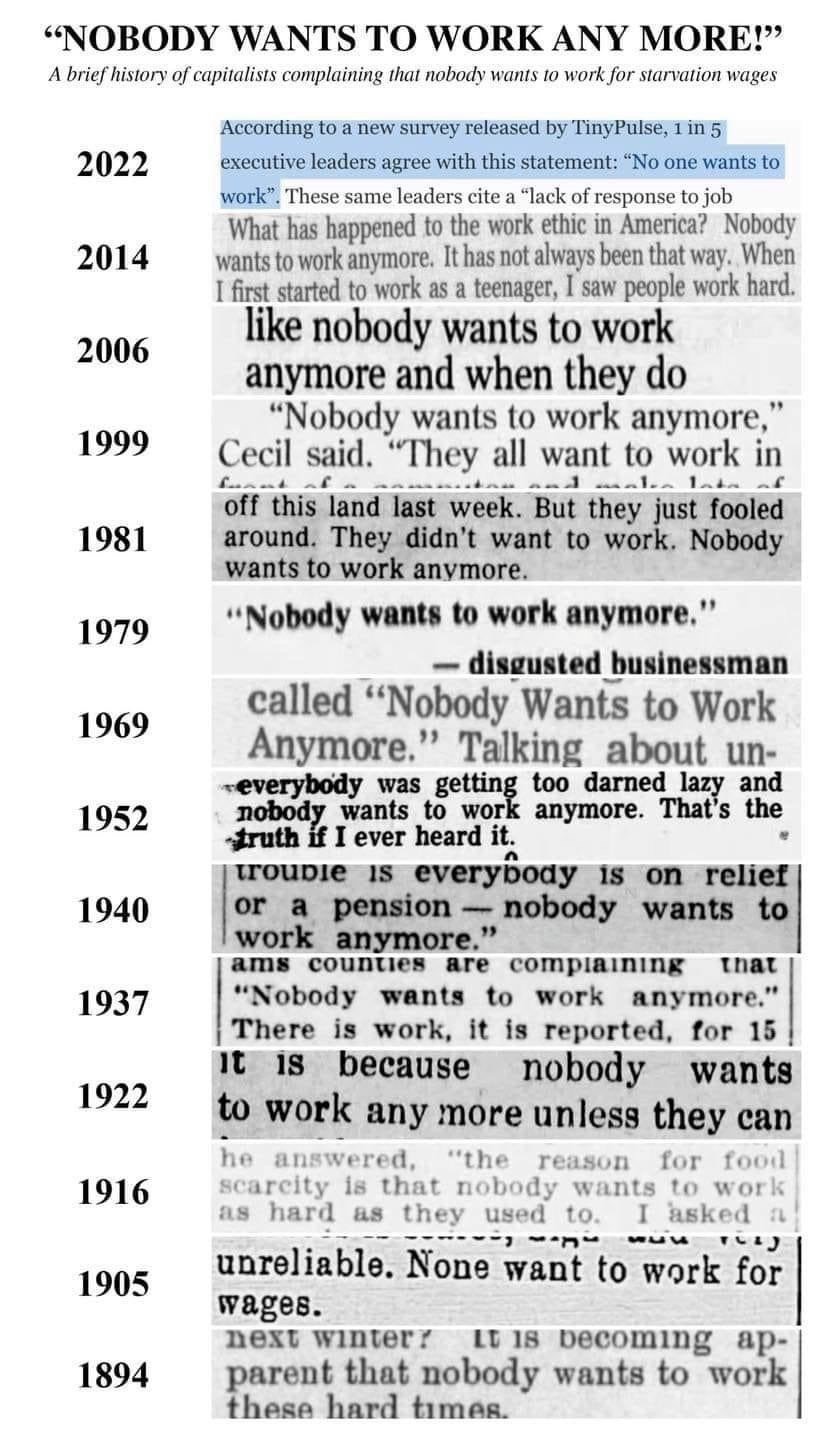deleted by creator
ITT people with drastically different ideas of what hybrid is.
Why do I feel like the next phase of this is changing the expectations of hybrid to be more like “9 in the office, 1 day from home”
deleted by creator
I worked hybrid 18 at home, 22 at the office and it sucked.
It showed me three things:
• It showed me that I was far more productive when I was at home and I was comfortable and not distracted.
• It showed me that I was coming into the office for absolutely no logical reason (even while there, all discussion was via Slack and Zoom).
• It showed me that the company’s leadership was incompetent.
This wasn’t even a ‘we paid for the space, we have to use it’ issue. This was an office job at a light industrial facility where no one had to be in the office. If they didn’t have us come in, they could have knocked down the office area and put in another line or two. Just incompetence.
I treat office days as social days for exactly this reason. I know I’m not getting anything done, there are too many distractions, so I MUST be being forced to come into this disaster zone for one reason - to recharge. So that’s what I do.
I told my boss that I get less done in the office. The temperature is always wrong. The monitors aren’t as good as what I have as home. There’s distractions. So many distractions. Sales guys are loud. People walking up to you. You can’t ignore a person standing next to you like you can ignore a slack message.
I told him I’d go in, but it would be a day of bullshitting and not doing much work.
Fortunately, he hasn’t really pushed the issue since. If the CEO gets the idea in his head again it’s going to be conflict.
What I’d really like to do is form a union, but labor in the US is extremely weak.
The only way I got anything done in the office was to wear noise-canceling headphones all the time. At which point, why bother coming in? I couldn’t hear anyone anyway.
I’m pretty lucky, in my industry, remote work has become the norm, so much so that my previous employer ended up closing the local office where I worked when I first started because [1] most of our colleagues were all over the country and [2] nobody thought there was a point to going back. I’m looking for a new job, and every prospect I’ve checked out so far is doing the same, almost fully remote. It just doesn’t make any sense to do otherwise.
I offered to work from home yesterday because I have bronchitis and no voice, so I told my manager it was that or I go off sick and stay there until I deem I feel better, that half a loaf was better than none, and she said “well I don’t want to set a precedent”, so I told her that I was sick then and won’t be back until I feel better. I’m the only one who can do my job, so she’s right fucked. She’s like an alien wearing a skin suit trying to pretend to human.
Seems like she did set a precedent anyways haha just a worse one than before
The manager doesn’t get to make the decision. She’s probably going to have to go argue with her manager that also likely has no control. Stand your ground, they don’t want to fight on this hill. -source, a people manager of hybrid teams at a company that insisted on on-site.
Her manager would say yes and not care. It’s my direct manager just being micro managery.
Some directors (or whatever manager managers are called in your pyramid) like to pretend to be the good guy to individuals and force their intermediaries to look like the assholes. Middle management sucks.
“I don’t want anyone to realize they can work just as effectively from home. Sure it saves them gas and commute time, but it just doesn’t pump my ego if I cannot micromanage in person.”
Precisely. So she shot herself in the foot and I had a day to recover. I might call off Monday too.
You should
I’m at urgent care right now actually to try to get some better puffers or a nebulizer or something. I might just.
I’ve had a personal policy of not working from home when I’m sick, even before the pan. I want solid recovery time because experience has taught me that doing anything else just keeps me sick longer. Take all the time you need, even if you only need it a little bit but could otherwise power through. She put herself and you in this situation. Reap all the recovery time needed to return at 100%.
She has understaffed us to a criminal degree all because she gets a bonus if she comes in under budget. You are correct, I will take all the time I need. I had to go to urgent care last night for a nebulizer so I’m definitely still not well, it’s actually resolving pneumonia it turns out.
Hope you feel better.
Thank you!
Did we actually believe any of them at the time? I think they already knew that remote work was going to continue, and they were trying to get as much money out of the transition as possible.
One problem was that they had wasted real estate, and they had to justify it to shareholders. So they pretended that they were going to bring everyone back to the office.
If you think about it from a medium run perspective, of course employers are going to want more remote work because then they don’t have to pay for utilities or parking or rent or buildings. Of course this depends on the exact setup, but for many businesses it was clear from the beginning of the pandemic where things were going to go. And if we want to get even more cynical, we can point out that when your labor pool spans the country or even the world, you have a greater ability to underpay employees.
They want remote work so they can get the cheapest labor. Be on guard for average salaries to start dropping.
If you can do your job from home and your job can be taught under 5 years. Then 5 indians guys can do it together for 10 times less total than you cost. And that will be the case until what happenned to China happens to India, which should take roughly 40 years.
We found this to be NOT true. Half, at best. But wait.
So it’s 1/10 in its heyday, but when you pay someone 1/10th salary in a land of 1/50th salary, that person becomes a target. They look comparatively rich, their house gets repaired, their kids show the signs of an economic bump, etc. So now your guy can get robbed or kidnapped, so you need a driver and protection. And the kids need to go to a different school with a gate. And the spouse needs to get back and forth safely. And then a better house, moving to a gated community or apartment, with more guards. And suddenly you’re paying for company housing, schooling, cars, drivers, tutors, guards, cameras/surveillance, cooks, maids, deliveries, and even extended family is moving in for safety.
So it’s still a bargain on paper, but then it’s just half. They don’t mention this because it’s hard to sell an idea when 80% of it is eroded.
Your employee or team now works on the other side of the world, with a different culture and management style from what you’re used to with Americans, different communications and workflow, and everything’s still around the world so it’s a day’s delay for everything.
The culture and work environment has trained some regions to NEVER admit they don’t know something; just nod, smile, and try to figure it out with confidence. Dunning-kruger be damned, sometimes that’s not a good way to do something in my field, which is incredibly technical. We can’t even educate the locals on risks of bad supply chains (curl|sh anyone? Flatpacks and CPAN and NPM and composer? Find out why these are risks) and doing so with the different “never say you don’t understand or you’re fired” environment is an added challenge. “Did you check for compliance?” will only ever get a “Yes”, even if you don’t mention which standard.
So your management - especially in offshores - needs an entirely different mindset and workflow, and you need to have people to check on the compliance and readiness and completeness who will say when it’s not ready because they’re not gonna be fired for it. This kind of thing surprised us and it will surprise the "I just wanna save money and this guy said 1/10th! " crowd. It’s not “you get what you pay for”, so don’t misunderstand; it’s just different. And if you can cope with all the differences and don’t freak out that you’re not saving so much for same-same work, it’s … an idea. In my case, the offshored staff slowly shrunk until we moved the offshoring to Poland.
You guys are getting paid at your job?
I’ve been outsourced more than once, while working in an office.
Yeah but we wanted to work from home not hybrid bullshit. This story is pandering like we won but they are still forcing me to go to an office every week for no good reason. This is just propaganda. The whole conversation in the thread has even shifted from talking about working at home full time to hybrid being ok. Insane
hear hear. Offices are outmoded, office managers are outmoded, paying for parking is outmoded.
All of it is horseshit, and like horseshit should be deposited indiscriminately and walked away from without looking back.
I don’t know why you think that’s all propaganda, i personally like hybrid work a lot more as well. I like my office, i like being able to go for a coffee with my colleagues and so on. I do like working from home as well - but i’m totally okay with being 1-2 days in the office. However, we do have people working 90% from home - they have to come in to the office though for various things they have to do. Printing large format plans, etc, etc. You can’t just assume 100% home full time works for everyone and shift the goalpost.
And I love not even knowing where my office is, different strokes…
I think it should be a choice not 100% at all. I’m personally upset because I was told it was ok to be fully remote so I adjusted my life then once it wasn’t convenient for my company anymore they changed the rules on me and everyone else and gaslighted us all about the real reason.
Well, okay, that’s understandable then…and pretty shitty
Yeah but we wanted to work from home not hybrid bullshit. This story is pandering like we won but they are still forcing me to go to an office every week for no good reason. This is just propaganda. The whole conversation in the thread has even shifted from talking about working at home full time to hybrid being ok. Insane
The comment I’m replying to needs to be upvoted much more than it is.
Rage on, fellow rager.
Going to the office once a week is one thing the Indian guys can’t do. Love it don’t fight it, unless you have a workable solution to end capitalism or globalism.
Going to the office once a week is one thing the Indian guys can’t do. Love it don’t fight it, unless you have a workable solution to end capitalism or globalism.
Going to the office once a week is one thing the Indian guys can’t do. Love it don’t fight it, unless you have a workable solution to end capitalism or globalism.
Capitalism ended during the pandemic? Who knew?
Going to the office once a week is one thing the Indian guys can’t do. Love it don’t fight it, unless you have a workable solution to end capitalism or globalism.

DefeatedMildly annoyed CEOs are now conceding hybrid working is here to stayFTFT.
They have their wealth and their heads are still attached to their necks - there is nothing “defeated” about them.
As it should be. Hybrid is the correct answer. Not full time RTO, not full time at home, Hybrid. The negotiation is in how hybrid should look, and will vary from situation to situation
Hybrid is the worst of both worlds, you don’t meet your collegues when you’re at the office because they choose to be in on a different day, and you can’t live where ever in a similar timezone because you still need to be able to get to the office in a reasonable time.
deleted by creator
Hybrid is the worst of both worlds. You have to maintain an at-home office AND the office that is largely empty.
enterprising execs will take advantage of this, then use RTO for soft layoffs. Wax and wane until laws change.
There’s no one single “correct answer.” There are plenty of jobs where full time at home is just fine.
I have a real problem with hybrid for roles that don’t require an in-office presence because it arbitrarily region locks a role.
It’s great that office workers get this benefit, but it hurts to see as a person who has to be onsite for their industry. Or just any increase in the benefits of my job.
I’d love zero commute and the comfort of home.
this should also lead to better benefits and pay for on-site workers. many people will start looking for office jobs which increases demand for on-site.
My industry is completely understaffed, it hasn’t led to better wages.
Unionize and fight.
I see no issue with people that are forced to RTO being paid a travel allowance of some sort, it’s time taken from them for job related activities.
Normalize paying for the commute. I think that would be a positive thing.
Should office workers get worse conditions because of your career choice? If work from home is so important to you, why not get an office job?
“I want to be a marine biologist but I don’t think it’s fair that I can’t just work in the town I grew up in in the middle of Iowa!”
No.
I literally said it’s great to see them get a benefit.
That doesn’t mean it doesn’t sting when you see other industries seeing improvements, while your own is constantly treated like shit. And I work in early childhood education, if we all just left that would fuck over the children and risk their lives.
Just like any other strike ends up hurting someone, gotta break eggs to make an omelette.
People who do your job go on strike every few years around here and the parents have to take the slack, it’s not your problem.
Would you be thinking of the children if you were asked to do your job for free? Hell no.
To reinforce this, if my kids school system went on strike I would be behind it 100%.
It would fucking suck for us, but educators deserve better and I want them to get it.
At least the commute will be less crowded for those who have to make it.
Our company is doing the opposite and forcing everyone to RTW 5-days a week. Can’t wait for the exodus and the “I told you so”
They’re not “defeated”. They got exactly what they wanted. People leaving without having to lay them off through attrition.
Now that they think they have “right-sized” their workforce at no cost, they nicely offer to concede hybrid working to keep the rest of their employees.
Which leads to the question, and its an honest question and I would benefit from the honest answer: If I can do the job hybrid, why can I not do the job remote? Is it because you needed me to move some paper boxes to the printer?
There are some aituations for some roles where meeting in person is necessary for trust and connections to be established. Being in person lets a lot of people feel a better connection with teammates, because humans are animals and that is just how it works.
This is nit true for every role, and is mostly for roles that have to work with people whose primary jobs are interpersonal or connection making like executives and leadership.
It does not really apply to roles where deliverables are already spelled out and information exchangenis formalized and you don’t need to convince someone to do something ad hoc. Plus some people do just fine doing all of those things remotely, but they have to work with people who don’t.
for trust and connections to be established.
What is more trusting than a recorded Zoom meeting.
Oh, you mean you need me off the record to be made complicit in malfeasance.
Pass.
No, a lot of people just feel more trust from being in the same room with someone and getting a better feeling from being in proximity with the person. It has nothig to do with on and off the record. Do you really record all of your zoom calls to CYA?
Think of it like attending a concert in person compared to listening to an album, it is just a different experience in person. Not everyone gets that out of in person interactions, but a lot of people do.
It has nothig to do with on and off the record
It is exactly what it is though… you don’t see that?
Way to ignore the point
As someone who works hybrid and frequently has both in person and online meetings that are rarely if ever recorded, no I don’t see that as the default expectation.
I can see that it could be, if the people I was interacting with were evil and untrustworthy, but that wouldn’t be a job I would stick with for any length of time. What I have seen is that quite a few people just work better with others if they meet in person occasionally.
There is a reason that a lot of knowledge work has conferences to share knowledge in person.
Idk man…
Introverts thrive in non-social settings. Introverts tend to be good at technology.
Extroverts thrive in arenas, where they can set odds and smash opponents into submission.
It all sounds like a stern conviction of supporting the bullies, and preventing work from being done.
That is just putting everyone into extreme ends of social interaction when the vast, vast majority of people are somewhere in between. Even the most extroverted people I work with like some human interaction, just less than the more social people. I don’t work with anyone in an IT setting who fits the extremes you are describing, although I have met them.
In my 20 years of working in the office and an additional 4 working 100% WFH, I’ll throw my worthless internet opinion out there as to why: It comes down to the culture of the company.
Some companies see a real benefit from water tank conversations, face-to-face meetings, and the ability for managers to ask someone in person on a moment’s notice to do things. There is also a lack of trust in the employees being able to perform correctly without physical oversight in many companies. Granted and aside from the trust issue, there is some truth to that, but can in fact be realigned with the exact same benefit by retooling communications. It’s up to each company however to formulate the best course of action to remedy that and many sadly fail, resulting in RTO mandates.
Some companies see a real benefit from water tank conversations
There are real benefits to water cooler spontaneous talk. However, they don’t overcome the detriments to having all your staff commute all the time on the off chance one will occur to produce a positive result.
face-to-face meetings, and the ability for managers to ask someone in person on a moment’s notice to do things.
These are largely dead in hybrid scenarios, because those that would be meeting face to face don’t work in the office on the same day. So the practical result to hybrid is the worker loses productivity from the commute to come into the office for one or two days an sits at a desk alone all day in video meetings with their coworkers just like they’d do at home. The next day their coworker does the same while the original worker is WFH that day.
I am not op but I’m pretty sure they’re speaking from the point of view of companies, not agreeing with their ideas
Yep, I get that. I’m responding to that point-of-view of those companies, and how I believe its in error. I have nothing against the poster or their comments.
These are largely dead in hybrid scenarios, because those that would be meeting face to face don’t work in the office on the same day.
I work at an office that started hybrid after covid because enough employees quit when they went to full RTO. The IT department ended up with 2 days in and 3 days remote, but the 2 days are the same for everyone so that we are all in the office at the same time for the spontaneous conversations.
It works pretty well. 2 days to collaborate and keep up relationships, the other three days to get individually completed work done.
Water tank conversations really fuck with remote workers because they are always missing something, but if you can manage to redirect all work talk to happen in whatever communication tool the company uses, everyone tends to work better in the end, as nobody misses anything. But the only way I’ve seen companies successfully do this is by adopting remote-first approaches - when people only go to the office like once a month if even that.
Do they know that it’s much harder to unionize if you’re remote?
The thing is, water cooler chats are impromptu, they are not planned. You meet your colleague, you talk about the weather, what’s new in his life, and one thing leads to another, to maybe to talk about work and how to strategise to get something done.
These impromptu conversations happen on a whim, they happen organically. They cannot be forced.
Sometimes Alice needs coffee while Bob is using the microwave, and sometimes Bob and Alice do more than say hi, and sometimes that leads to a productive work conversation.
Carol and Dave do not need spontaneous small talk to be productive.
This makes Grace very angry. Carol and Dave are ordered to be more like Alice and Bob.
Carol and Dave do not understand this, and vent to their friend Frank. Frank says that he sees this happen a lot, and suggests that they come to work for his boss, Oscar, instead. Carol and Dave give their two weeks notice to Grace.
This makes Grace very angry. Alice and Bob agree that it is an outrage, then go back to discussing the previous night’s sporting event.
Wendy is given Carol and Dave’s workload and doesn’t have time to join Alice and Bob at the water cooler. Wendy keeps falling further and further behind.
This makes Grace very angry. “No one wants to work anymore!”
Wendy has about had it with Grace’s bullshit.
The point is not to force those talks to happen, the point is to make them not happen in a limited way. In an office what usually happens is people talking to other specific people about problems they are facing, by going to their desk or catching them on the coffee room. This should absolutely never happen. Any work talk should always be accessible to everyone involved. I don’t mean the whole company, but if there’s 5 people in a project, there should never be any private conversation between just two of them - even if others don’t join the talk they should always know the conversation is happening.
Yes, I agree, it has to be fair for everyone. What I’m talking about is instinctive, primal behaviour that we can’t control because we’re social animals and when we meet we naturally have a discussion with the person we’re talking to and we might end up talking about the project without taking into account our colleagues far away from the office.
We’re still adapting to this new hybrid reality.
Coaching newbies doesn’t work that well remotely, so you’ll have to be at the office more for them to ask you questions, otherwise they’re stuck in the simplest things for days.
When the company where I was managing a small team went full remote during COVID, I had 0 issues with my existing staff, but when I had to hire, that was definitely less than ideal for onboarding. We still made it work but it was nothing like the in-office onboardings from before. There are solutions though, you can do virtual sit-togethers, and if you’re reactive to slack/etc you can be even more present for them than in-person, but it felt uneasy for sure the first times. Left all corporate behind now and running a one man business so don’t need to care about this.
Any evidence to back that up?
That’s the line my CEO used, but we had plenty of hires join during COVID that have excelled while here, with lots of talented engineers that had to leave because they were forced to an office hundreds of miles away.
Personal experience. The juniors just out of school and interns are invariably stuck in something trivial that can often be solved with looking at their stuff for a few seconds. They don’t dare to disturb you with any questions and need a lot of explaining. Doing all the explaining through the screen is a pain and you have to hound them with calls to get them to ask questions.
Experienced new hires don’t have that issue. They can Google stuff, read a manual and know when to send a message for a blocking issue.
That’s doesn’t mean send everybody to the office. Just the new guy and the coach should be enough in most cases and reduce the presence as they hit their stride.
The juniors just out of school and interns are invariably stuck in something trivial that can often be solved with looking at their stuff for a few seconds.
If only there were a way to share your screen remotely…
And that’s why you do stand-ups every day, which everybody loves to hate.
Yeah sorry but that’s not the same. Efficient teaching is very highly dependent on nonverbal cues to properly align yourself to the person you’re teaching to. On top of that screen sharing software is clunky and necessarily has latency, which makes interrupting much more disruptive which is most detrimental when there needs to be a bidirectional high-throughput stream of information.
Efficient teaching is very highly dependent on nonverbal cues to properly align yourself to the person you’re teaching to.
I would say that is highly dependent on the type of learner you are.
My daughter is in online school right now. Her teachers usually can’t see her because most of them don’t require her to have her camera on. She often can’t see them because she’s doing screen sharing. She’s getting better grades than she’s ever had before.
On top of that screen sharing software is clunky and necessarily has latency
I don’t know when the last time you used it was, but this is just not true anymore. It’s as easy as clicking ‘share screen’ in Zoom or Google Meet and the latency is so low that it’s essentially not noticeable.
I work 80 % remotely, I know what I’m talking about. MS Teams is by far the worst latency-wise, but even on the best software you can’t get over the fact that there will be a 200-300 ms jitter buffer.
Ever had the “yeah I- so we - OK go ahea- sorry -”? That’s what I’m talking about.
Good on your daughter if she learns well remotely, but literally everyone I’ve talked to who was in education during COVID had an awful experience. Although I suppose in the school system it doesn’t matter as much since with 20-600 students per teacher there’s not much back-and-forth going on anyway.
Remote work is great for focusing, it’s great for async workflows (slack/discord/email/jira), it’s great for solo work, but it’s just plain inferior for certain highly collaborative workflows like 1-on-1 teaching. There’s enough good reasons to work remotely that we don’t have to lie about the rest.
This is evidence that you need to adjust your training methods.
I think that might depend on who you’re hiring though. That’s the same line our boss told me when they pushed me back to the office. But in the time since then, we have hired several new staff who actually prefer to communicate digitally. They will email, teams, phone, or text me with questions before actually seeking me out in person.
I thought this until I’ve actually done it a few times, and been that newbie at a remote first employer.
The difference in being on boarded at a company which embraces remote vs one that is still hedging, is massive.
It can be done well.
Yes the extroverts might get fidgety, but they can schedule a meeting or body doubling session or something. We introverts have had to adjust to office work for the last century; let’s see y’all do a bit of that labour for another, better way to do info work now :p
Tax breaks from cities saying they have X employees working in city Y and they bought a bunch of commercial real estate that is worthless or needs to be converted to residential. They gambled and lost and now want to either say they didn’t lose or subsidize their losses to employees & taxpayers.
Hybrid isn’t good enough
Far better than what most had, though. Still, until companies also start paying people during their commute, it isn’t enough.




















